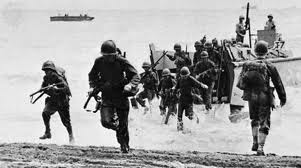 In World War II, newspapers, patriotic films, radio, and magazines were replete with pictures of P-47's zooming through the skies, PT boats spraying vee-shaped foam at high speeds, aircraft carriers tossing torpedo planes aloft, and Marines sprinting ashore to storm the beaches.
In World War II, newspapers, patriotic films, radio, and magazines were replete with pictures of P-47's zooming through the skies, PT boats spraying vee-shaped foam at high speeds, aircraft carriers tossing torpedo planes aloft, and Marines sprinting ashore to storm the beaches. We knew it made the folks at home feel better, which was just fine. We also knew that our vessels were as unglamorous as the U.S. Navy had. We were the “blocking guards,” the military's “grunts.” Which was also just fine with us. Working around the clock for weeks on end didn't put us in the news. But it moved the map markings across the Pacific and up the China Sea toward Tokyo.
Not even the Navy gave us much attention. In one sense, we were invisible, which was also just fine. A senior officer yelled at me only once in the entire war, which was not par in any part of the military. In fact, “dressing down” seemed to be almost part of the Navy Manual.
That occasion is worth describing under its circumstances.
While we were backing off a beach after unloading multi-thousands of aircraft parts for the Samar Marine operation, I received a coded message from my group commander to proceed to a spot in the Leyte Gulf off Samar. He didn't usually bother with coded messages, so we knew there was something different about this order. It was different all right.
 |
| Reef |
Even without circling the vessel, we could see its relationship to the reef, so I eased toward it so that we could “tie to" from a point farthest from the reef.
 |
USS Dorthea L. Dix in port during World War II |
As I eased us to the ship, we could hear him screaming epithets, encompassing some of the most flowery language I ever heard. (In the military, that's an achievement). He was making it clear that, if I didn't do exactly what he ordered me to do, he'd “have my ---.”
Ignoring him, I focused on the O.D. (Officer of the Deck) because he was the one who would have to tell the sailors what I would need them to do. I signaled for the troop ship's crew to toss lines from two spots on their ship to places on my port and starboard bows, where the lines could be cleated.
Happily, the O.D. cooperated with me instead of paying attention to his captain. The lines came over correctly, my men secured them at once, and I began backing away, tightening the lines. I had determined which direction to tow, so the troop ship would slip off the reef, rather than grind against it. Shortly, the monster vessel assumed a more natural posture in the water, and, in another few moments, I felt the lines slacken. My men released them, letting us coast free and the trooper rocked slightly.
As the troop ship righted, a roaring cheer like a stadium touchdown rolled across the water. The Officer of the Deck crossed himself. The captain disappeared.
My group commander never said a word about the incident. On the record, his and mine, the occasion never happened. He didn't want that, nor did I want to go through an investigation, and the troop ship captain sure didn't want to face a court martial.
I've always felt good about that memory. My crew was typically magnificent. Bert Singer, a junior officer, got to ignore an “eagle” captain, and over a thousand soldiers had a funny story to take home about a funny little ship that brightened their war.
















